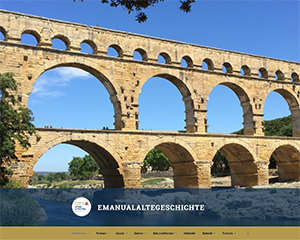eManual Alte Geschichte
The eManual Alte Geschichte (eManual Ancient History) is a free digital offer by the Hamburg Open Online University, which teaches the basics of ancient history in a generally understandable manner and based on reliable research results.
The 39 podcasts, for which Prof. Dr. Werner Rieß and his team are responsible, provide an overview from the time of the Greek Archaic period to Roman Late Antiquity.
They are accompanied by various materials (e.g. timelines, sources, constitutional schemata) that can also be used for history teaching and offer a wide range of suggestions for in-depth study, for example in seminars.
The eManual Ancient History represents a comprehensive learning scenario for everyone interested in ancient history. It will offer a profound introduction to Greek and Roman history in four pillars.
- Pillar I consists of: podcasts and a glossary of terms, names and places in ancient history.
- Pillar II includes: Sources on all periods of ancient history in English or German translation with comments and key questions about the sources.
- Pillar III contains: Texts on methods and theories of historical scholarship with key questions and comments.
- Pillar IV offers: Working materials with practice sections on the formalities of writing works in the humanities.
Method
In the digital learning scenario, the learners themselves acquire an extensive and secure basic historical knowledge in an interactive and problem-oriented manner: They independently select pillars for the acquisition of knowledge and epochs of ancient history and gain an insight into the history of antiquity that is not yet available internationally in the field of e-learning. Both famous figures of antiquity (Alexander the Great, Caesar) and the cultural foundations of our present, which were laid in antiquity (democracy, Christianity), can thus be experienced digitally.
Learning Objectives
With independent access to learning material (podcasts, sources, secondary literature, other materials), learners can reproduce in their own words basic features of ancient social, economic, intellectual, administrative, religious and, above all, event history.
Learners can describe different research opinions from the secondary literature of ancient history, assign them to historical-scientific methods and explain their application, especially with regard to ancient history, and develop their own interpretative approaches to historical events, actors and phenomena.
With the help of the instructions available in the learning scenario (Pillar IV), learners can present ancient historical topics in various media and forms of presentation (lecture, term paper, handout, review) and cite ancient historical sources such as secondary literature according to the subject-specific standards of ancient history.
Propylaeum cooperates with the eManual Ancient History and takes over the long-term archiving of the podcasts and source material. The learning material can be accessed and researched via the pool eManual Ancient History in heidICON and Propylaeum-DOK..
Contact
Prof. Dr. Werner Rieß
Universität Hamburg
Alte Geschichte
Überseering 35 #5
22297 Hamburg
Tel.: +49 40 42838 4756
E-Mail: werner.riess@uni-hamburg.de



